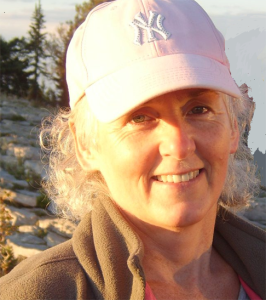Patricia Kinley: Hi, Catherine. I loved your essay, Chasing Normal. For me, it had just the right combination of the personal and the universal experience. Your own experience as a girl, then young woman, growing up and into full womanhood really resonated for me, having been very shy and coming late to my own appreciation of myself. I’m wondering if you can tell me what Chasing Normal is about and how you came up with such a poignant title?
Catherine Dowling: I’m glad the essay resonated with you. It started off as a story about internet dating experiences, not anything historical. But as I wrote, my past kept intruding on the present and a theme emerged. I remembered how awful it feels when you’re a teenager and you’re a bit different from others, a bit odd. How you desperately want to be like everyone else and find it so hard to appreciate your own uniqueness. What makes you who you are is often a source of embarrassment when you’re a teenager simply because it’s different from everyone else. So that’s what the essay is about. It’s about appreciating who you are, as you are. I really didn’t come to the title until I finished the essay and realized that many of us spend a good part of our young lives trying to be what we see as normal. I’ve spent nearly 20 years as a breathwork psychotherapist and I know this is a dilemma that haunts people well into adulthood. Growing up is often a process of growing into who we are, of appreciating our own uniqueness.
PK: “Normal” is so subjective. What does “normal” mean to you and was it more important to feel “normal” or to be perceived as “normal” during your varied age in which essay is placed?
CD: I guess “normal” is culturally determined to a large extent. Normal means being thin when thin is in fashion (when is it not?), it means being socially adept, attractive, sexy, flirty. Girls, at least in my generation, tended to define themselves by their ability to have relationships. And that meant getting engaged and married and having children. That was normal. Fortunately I also had some friends and classmates for whom intellectual achievements were very important. I think many of us have an idea of what we should be and it’s usually different from what we actually are. We can spend a lot of energy and angst trying to achieve that. Now I would say there’s no such thing as normal.

PK: I’m thinking that had I read your essay at a young age, it would have helped me process my feelings and find solace in that I would eventually grow into a confident self. Yet, as a grown woman, the essay gives language to my own trajectory to that very same place. And it’s not a stretch, I think, to believe boys and men could be enlightened by Chasing Normal, too. So my question is, when you wrote this piece, were you hoping to appeal to a particular gender/age group?
CD: I didn’t have a particular age group in mind, but I was aware of the universality of the theme. I did think in terms of women but now that you mention it, wanting to fit in can be a huge pressure for boys too. It shows in a different way with boys, but it’s definitely there. I’d be extremely pleased if it spoke to teenagers and saved at least one person the years it took me, and many others, to arrive at an appreciation of their own individuality.
PK: I took quite a lot away from the essay – the appreciation of honest writing, the relativity to my own experiences, the visceral joy of your “ah ha!” moment . What do you hope a reader will take away from it?
CD: I hope they enjoy the experience of reading. I love the craft of writing, of sculpting words and sentences into something that’s as flowing and rounded and pleasurable as I can make it. I hope readers also find it a little bit funny. And if they are in a place in their lives where they’re not fully appreciating themselves, I hope they get a little closer to the joy of being exactly who they are. When people talk about recovery, they’re usually referring to recovery from illness, or addiction. For me, life is a process of small recoveries, from limits, from the way we sometimes see ourselves, from self-criticism. Recovery is growth, growing into fullness, becoming who we are. And it never ends. It’s what life is about.
PK: I understand that you have already published a book and have another one in the hopper. Can you tell me about both and tell me what you have planned for your next writing project?
CD: I have a strong background in adult education. Adults learn experientially. I write mainly about self-development but I like to do it through telling stories. Stories make concepts accessible so the reader has the experience and the understanding before they ever get to the concepts being covered in a chapter. My books contain lots of stories about people’s lives, which I hope also makes them entertaining. My first book was published in the UK. It’s called Rebirthing and Breathwork and it’s about breathwork as a really effective tool for emotional and spiritual growth. My next one is called Getting to One: Five Keys to a Fully Lived Life and it will come out in 2014. That’s about spiritual experiences and how to put the wisdom of spirituality into practice in life. I’ve been so busy getting it finished and developing a marketing plan that I haven’t given the next writing project much thought.
PK: So many of us have been married, raised families, pursued careers, and yet find ourselves living alone at an age we felt we never would. For those of us who still hold out for romantic love, do you have any dating advice?
CD: Oh lord no, none. You’d need a different kind of writer for that, a romance writer maybe.
PK: Haha! I’ll head to my nearest library. Well, thanks, Catherine, so much for your time. It’s been a pleasure talking to you and I do so look forward to more of your written work!
Patricia Kinley is a writer, writing coach and copy editor. Her website is under development, but she can, in the meantime, be reached via email at pkinley07@yahoo.com.


Pingback: Chasing Normal | Rkvry Quarterly Literary Journal